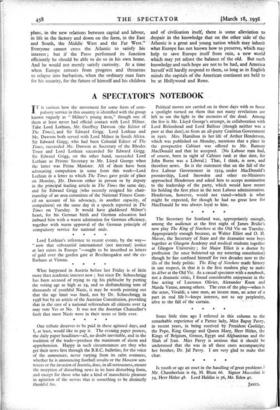A SPECTATOR'S NOTEBOOK IT is curious how the movement for
some form of com- pulsory service in this country is identified with the group known vaguely as " Milner's young men," though one of them at least never had official contact with Lord Milner. Take Lord Lothian, Mr. Geoffrey Dawson (the Editor of The Times), and Sir Edward Grigg. Lord Lothian and Mr. Dawson both served with Lord Milner in South Africa. Sir Edward Grigg, who had been Colonial Editor of The Times, succeeded Mr. Dawson as Secretary of the Rhodes Trust and Lord • Lothian succeeded Sir Edward Grigg. Sir Edward Grigg, on the other hand, succeeded Lord Lothian as Private Secretary to -Mr. Lloyd George. when the latter was Prime Minister. All of them have been advocating compulsion in some form this week—Lord Lothian in a letter to which The Times gave pride of place on Monday, Vir. Dawson either in person or by deputy in the principal leading article in. The Times the same day, and Sir Edward Grigg (who recently resigned his chair- manship of an area committee of the National Fitness Coun- cil on account of his advocacy, in another capacity, of compulsion) on the same- day in a speech reported in The Times on Tuesday. It would have gladdened Milner's heart, for his German birth and German education had imbued- him with a warm admiration for German efficiency, together with warm approval of the German principle of compulsory service for national ends.
* * * *














































 Previous page
Previous page